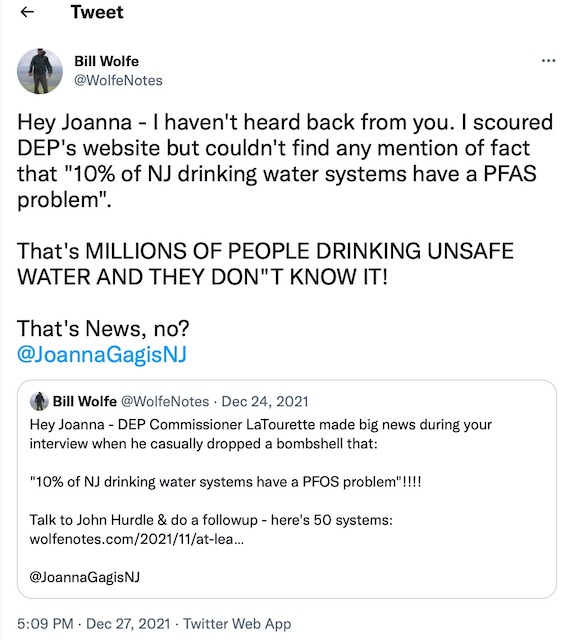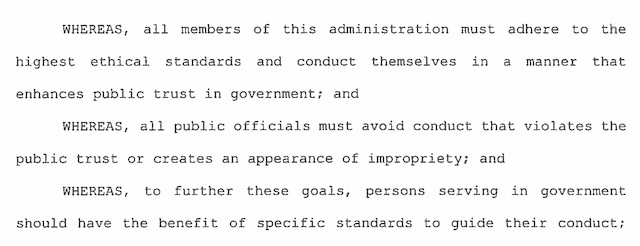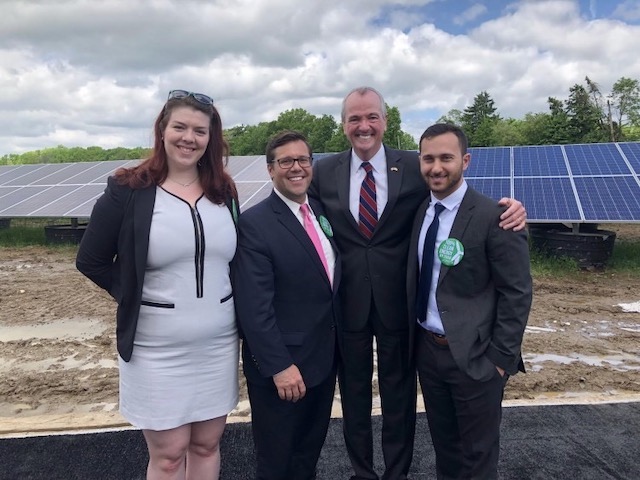NJ Gov. Murphy’s Portrayal Of DEP Commissioner LaTourette As A Public Interest Lawyer Is A Fraud
DEP’s Failure To Adopt Natural Resource Damage Regulations Means NJ Loses Billions Of Dollars
LaTourette Gaslights The Public About Holding Corporate Polluters Accountable
On Tuesday night (Jan. 25), NJ Spotlight news provided a platform for Murphy DEP Commissioner LaTourette – without qualification or challenge by facts or expert sources – to gaslight the people of NJ.
In this Spotlight interview, former corporate lawyer LaTourette emphasized the need to hold corporate polluters accountable and make them pay to cleanup NJ’s drinking water (starting at time 2:33 – emphasis mine):
[treatment technology] has a cost, a cost that the water systems and the residents of NJ should not pay. Because the cost of curing what has befallen our water in NJ should be borne by those who caused it. The companies that put this material into the stream of commerce in the first place.
LaTourette is a lawyer, so he uses words carefully. So keep in mind his “material into the stream of commerce” theory as we expose this fraud.
The LaTourette gaslighting forces me to expose the total fraud being perpetrated on the people of NJ.
It’s complicated, but yet very simple. Here it is.
Basically, a “material into the stream of commerce” legal theory is at best a novel approach. DEP’s attempts to make corporations pay under that theory is highly uncertain – even unlikely – to prevail. Here it is (joint AG & DEP press release): (my emphasis)
TRENTON – Attorney General Gurbir S. Grewal, Department of Environmental Protection Commissioner (DEP) Catherine R. McCabe, and Acting Division of Consumer Affairs Director Paul Rodríguez announced today that the State has filed a lawsuit against companies for manufacturing and selling firefighting foam products in New Jersey for decades despite knowing those products released toxic and harmful chemicals into the environment.
The lawsuit, which includes both environmental and consumer fraud claims, seeks natural resource damages (NRD) along with other damages and penalties. It represents the tenth NRD lawsuit brought by the State since the beginning of the Murphy Administration in January 2018.
In contrast to a consumer fraud theory that is based on putting “materials” “into the stream of commerce“, DEP has clear regulatory authority and a strong legal tradition and court precedents to force corporate polluters to pay for the “release or discharge of hazardous substances” or “pollutants“ or “wastes“ into NJ’s land and water, including drinking water.
Polluters are not only required to cleanup their pollution, but must also compensate the public for “natural resource damages” when those pollution releases or discharges cause “injuries” or damages which include, among other things, the “lost use” of drinking water (DEP ONRR):
The Office of Natural Resource Restoration has the primary responsibility within the New Jersey Department of Environmental Protection for responding to discharges and other sources of pollution that trigger the DEP’s obligations as the trustee for all of New Jersey’s natural resources for the benefit of all of its citizens, now and in the future. This effort includes working with the persons responsible for conducting the remediation to return such natural resources to their pre-discharge quality, quantity, function, and value, and to implement restoration projects to compensate New Jersey citizens for the lost interim value or for the permanent loss of their natural resources.
To force corporate polluters to compensate the public for pollution and “lost use” of drinking water, the DEP used to rely primarily on a “formula” for estimating the value of polluted groundwater.
NJ Courts have ruled that in order to force corporate polluters to pay for NRD – including drinking water – the DEP must adopt that groundwater formula as a regulation, in accordance with rulemaking requirements.
But DEP has abandoned the groundwater formula that they know is not enforceable unless it is adopted as a regulation.
I previously wrote about and linked to the DEP NRD groundwater formula, but DEP has not only abandoned it, but taken down any trace that it even existed – the link below to it is dead:
The DEP’s Office of Natural Resource Restoration even has their own natural resource injury methods documents – one for calculating groundwater injury and one for identifying ecological injury, which defaults to the site remediation program’s “Baseline Ecological Assessment” conducted as part of the cleanup process at contaminated sites.
(we even petitioned the NJ Comptroller to intervene due to the huge fiscal impacts of DEP’s NRD failures).
DEP has failed to adopt Court directed NRD regulations and therefore is letting corporate polluters off the hook for billions of dollars of damages – a policy and practice that directly contradicts LaTourette’s TV claims. See:
This is why, among many others, the DEP will very likely settle the NRD aspects in the recent PFAS lawsuit against Solvay – and the consumer fraud and NRD aspects of the Dupont, Chemours, Exxon-Mobil, and 3M lawsuit – for pennies on the dollar.
[Note: The State of Delaware recently settled a statewide PFAS NRD lawsuit with Dupont et al for a paltry $50 million – pennies on the dollar.]
I) The Gaslighting Begins With The Governor
When NJ Gov. Murphy nominated Shawn LaTourette as DEP Commissioner, he issued a press release that portrayed LaTourette as a public interest lawyer, who fought corporate polluters on behalf of the communities they polluted:
With twenty years of environmental experience, LaTourette began his career partnering with the Erin Brockovich law firm to organize and defend New Jersey communities whose drinking water was contaminated by petrochemicals. Born and raised in New Jersey, LaTourette graduated magna cum laude from Rutgers University and earned his law degree summa cum laude from Rutgers Law School, where he was the class salutatorian and the recipient of multiple environmental and governance awards, and published scholarship on environmental law, natural resource damage,and climate issues. Before entering public service, LaTourette specialized in protecting the rights of victims of toxic injuries while also advising infrastructure, transportation, energy, and other industries on compliance with state and federal environmental laws and policies. Prior to joining the Murphy Administration, he was most recently a Director of the Environmental Law Department at Gibbons PC, where he focused on brownfields redevelopment projects and litigated environmental cases in state and federal court.
That portrait was false and misleading.
In fact, as I’ve written, at the time, LaTourette had recently served as lead lawyer for securing DEP permits for the Fortress Energy LNG export project.
But his corporate polluter lawyer record is far more extensive than that, as I revealed by releasing LaTourette’s ethics disclosures which showed that he had represented numerous corporate polluters and developers for many years. (hit this link, scroll down to read list of corporate clients in LaTourette’s recusal disclosure)
II) LaTourette’s DEP Failure To Adopt NRD Regulations To Force Corporate Compensation Is No Accident
LaTourette Litigated A Leading NRD Court Decision That Struck Down DEP’s NRD Claims
One case LaTourette litigated, however, stands out for its harm to the environment, DEP, and the public interest. And that case is:
Alan E. Kraus argued the cause for respondent (Latham & Watkins, L.L.P., attorneys; Mr. Kraus, Kira S. Dabby, Kegan A. Brown, and Shawn M. LaTourette, on the brief).
LaTourette Essex Chemical victory case was one of three major inter-related court cases involving DEP’s attempts to collect what are known as natural resource damages (NRD). See:
Corporations won all three DEP NRD cases, victories, which led directly to the HUGE loss of the DEP’s $8.9 billion NRD damage claim against Exxon in the Christie DEP’s dirty settlement deal.
The Christie Exxon was exposed as a corrupt sellout, by none other than former DEP Commissioner Bradley Campbell in a NY Times Op-Ed:
THE decision by the administration of Gov. Chris Christie to settle an environmental lawsuit against Exxon Mobil Corporation for roughly three cents on the dollar after more than a decade of litigation is an embarrassment to law enforcement and good government.
Ironically, Campbell’s failure to adopt DEP NRD regulations – which enabled LaTourette’s legal victory – was what contributed to the Christie DEP’s corrupt Exxon settlement.
[Full disclosure: I worked for Campbell at DEP from 2002 -2005, but never on NRD issues.]
This all came out later, in a forensic analysis of the huge $8.9 billion Exxon NRD sellout by the Christie administration by NJ Law Journal (NJLJ).
In that NJLJ story, we were cited as an expert source:
“There’s this wink and a nod going on where the DEP is saying, ‘We won’t squeeze you too hard if you just come to the table and settle,’” Wolfe said.
It’s been “a quiet little dance for 10 years,” with the state knowing it can’t get more than pennies on the dollar”, Wolfe said. ~~~ NJ Law Journal (4/3/15)
As the NJLJ story documented, exactly as we’ve written, DEP lost 3 NRD cases it litigated, going back over a decade to 2004.
- New Jersey Society of Environmental & Economic Development (SEED) v. Campbell (N.J. Super. Law Div., Mercer County, 2004)
- N.J. Dept. of Envtl. Prot. v. Exxon Mobil Corp., Docket No. MER-L-2933-02 (N.J. Super. Ct. Law Div. Aug. 24, 2007
- New Jersey Department of Environmental Protection, et al. v. Essex Chemical Corporation (Appellate Division, 2012)
As the NJLJ documented, the underlying legal reason DEP lost all 3 NRD cases it litigated was due to a lack of enforceable NRD regulations to define and quantify natural resource injuries and compensation/restoration requirements.
As the NJLJ story exposed, the DEP entered into a legal settlement agreement in the 2004 SEED case that obligated DEP to adopt NRD regulations, a commitment backed up by a letter from the Attorney General’s Office.
Here is the legal community’s contemporaneous September 2007 celebration of that August 2007 decision, a huge win for corporate polluters:
On August 24, 2007, the Superior Court of New Jersey issued an important bench ruling regarding the New Jersey Department of Environmental Protection’s (“NJDEP” or “Department”) natural resource damage (“NRD”) claim calculation. N.J. Dept. of Envtl. Prot. v. Exxon Mobil Corp., Docket No. MER-L-2933-02 (N.J. Super. Ct. Law Div. Aug. 24, 2007). …
… the Court awarded partial summary judgment to Exxon Mobil, dismissing the NJDEP’s claim with prejudice, because the Department had not provided sufficient expert support to uphold the assumptions utilized in the natural resource damages formula.
The Court noted that, in the context of litigation, NJDEP could have relied upon the formula to meet its burden or proof in either of two ways, by promulgating the formula as a rule, or by presenting expert proof supporting each of the elements of the formula, but NJDEP did neither.
In fact, the Court further stressed the appropriateness of rule making by alluding to the New Jersey Society of Environmental & Economic Development v. Campbell (“NJSEED”) case (Docket No. MER-L-343-04 (N.J. Super. Law Div., Mercer County) (Sabatino, J.)), reminding the NJDEP that it settled that particular case by agreeing to subject the ground water formula utilized in natural resource damages to administrative rule making. Although no such proposed rule has been published, there seem to be clear indications that rule making is appropriate and should be forthcoming. In the interim, companies involved in cases or settlement discussions wherein the NJDEP has calculated natural resource damages using this formula may have the benefit, even if temporary, of relying upon the Exxon Mobil decision to improve their bargaining positions since the NJDEP clearly cannot rely upon the formula in future litigation proceedings, without first developing further scientific justification in each case’s record for the assumptions used in the formula.
We, while at NJ PEER, explained the implications back in October 1, 2007 as well, see:
Trenton — In a stunning legal setback, the State of New Jersey cannot recover damages from polluters in what may be thousands of contaminated groundwater cases, according to Public Employees for Environmental Responsibility (PEER). The problem stems from the state’s failure to adopt regulations governing how to calculate “natural resources damages” (NRD) for polluted drinking water. As a result, polluters can avoid compensating the public for treatment of tainted groundwater, replacement water supply lines, drilling new wells and associated damages — leaving taxpayers with uncalculated costs.
Here’s a more recent 2018 law firms retrospective analysis:
The last major attempt by NJDEP to litigate certain NRD claims occurred back in 2007but resulted in a major loss when a Mercer County Court rejected NJDEP’s settlement formula, finding that its use was too speculative to support NJDEP’s calculations of NRD. NJDEP v. Exxon Mobil Corp. et al, Docket No. MER-L-2933-02 (N.J. Super. Ct. Law Div. Aug. 24, 2007).
Here is another 2018 legal analysis that confirms PEER’s assessment and highlights the damaging precedent that case set:
Although NJDEP has not adopted regulations to calculate NRD, with respect to its earlier NRD claims, NJDEP did develop a formula to calculate damages for injury to groundwater. The formula was used primarily as a basis for settlement discussions with potentially responsible parties. In NJDEP v. Exxon, Mer-L-2933-02 (Law Div. Aug. 24, 2007), when NJDEP attempted to use the formula in litigation, the court rejected it. The court held that because NJDEP did not adopt rules setting forth how to calculate NRD, it was required to prove each element of any calculation used to determine its damages. After reviewing NJDEP’s groundwater formula, the court found that the formula did not support NJDEP’s claimed damages. This case, however, did not prompt NJDEP to promulgate NRD rules and, as such, NJDEP will continue to face challenges on each aspect of its NRD calculation.
Despite this deeply troubling history of DEP failure that relieves corporations of billions of dollars of liability for their pollution and shifts the cleanup cost burden to the public, DEP still has not adopted NRD regulations and still is forced to settle NRD claims – including those involving the NRD damage of lost use of NJ drinking water – for just pennies on the dollar.
As the legal history shows, current Murphy DEP Commissioner LaTourette was involved in creating the legal vulnerabilities they caused this debacle and now he knowingly refuses to correct the problem by adopting NRD regulations.
So, for him now to spew righteous drivel on NJ Spotlight TeeVee about holding polluters accountable and making them pay is beyond Orwell – it is a scandal and sickens me.





